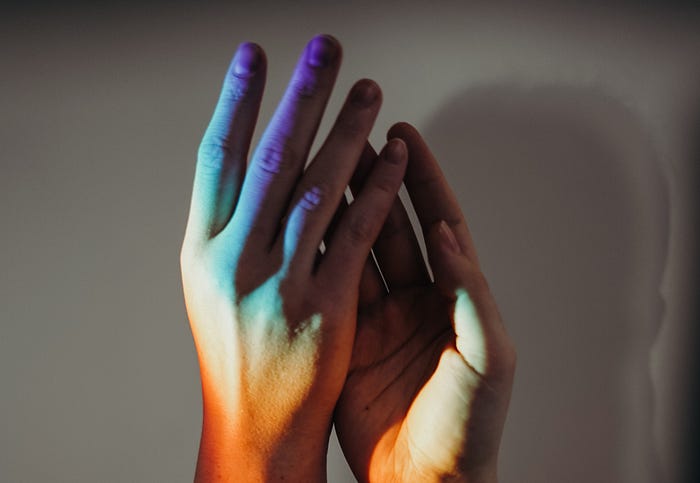
How words teach us about what it means to be human.

We live in a strange time for definitions. Questions of what it means to have a self, with its apparent elements of gender, race, sex, and all the other varieties of baggage that we spend so much time arguing over seem to be up in the air. How are we the same? How are we different? What does it mean that we are alive, with this brilliant inwardness and fire that is you, and us. This article attempts to take three related words and let them shine a light on how we understand ourselves.
Kin — We are particular

c. 1200, from Old English cynn “family; race; kind, sort, rank; nature” — of Germanic origin; related to Dutch kunne, from an Indo-European root meaning ‘give birth to’.
You have an experience that is unique, a background, a geography, a family, a religion, a set of encounters and experiences that are only yours. Much of this uniqueness is given- it comes before your choice to decide, you are born somewhere with a family not of your choosing and much of what comes across your path is not what you choose. Even much of your own personality comes before you decide it.
We also love in particulars – you love your family because they are yours, not someone else’s. This is significant, universal love takes individual shapes and is borne out in your choice to love someone. Yet this also means we are dependant. The word ‘Kin’ is related to the word ‘child’ in origin, and the period of absolute dependence we have as children mean we only become anything by somebody caring for us. In the words of Professor Cornel West “I am only who I am because somebody loved me, because somebody attended to me.” We learn what it means to love by example, sometimes bad, sometimes good, and those examples we carry through life, they are our own unique torches along the pilgrims path we all must walk.
This means that whatever we might believe, universal and moral first begins with particular love, firstly through the ways it is shown to us, positively and through its absence, and secondly in the ways we choose to love in return. I am only who I am because somebody loved me
Kind — We are different

From Old English gecynd “kind, nature, race,” related to cynn “family” — Old English cynd(e), gecynd(e), of Germanic origin; related to kin. The original sense was ‘nature, the natural order’, also ‘innate character, form, or condition’ (compare with kind2); hence ‘a class or race distinguished by innate characteristics’.
What these particulars of experience also mean, is that we are not the same. We can be categorised into classes ‘kinds’, of gender, race, nationalities, ethnicities, religious backgrounds, disabilities, and on and on. All of these intersectionalities provide useful ways of understanding the kinds of experiences we share.
It also means these things matter. While these experiences are subjective and culturally contingent they also reflect that differences are always passed on to us and shape our experience, and that knowledge and awareness of these things can contextualise and help us understand how history and culture form individual experience.
It is popular on the political right to belittle such ideas, yet without them we lose sight of how others possess kinds of experience we cannot understand unless their voice is raised. It is a meaningful political aim that on issues of race or gender, disability or marginalised people that those whose voice is heard are those voices who are most often not heard. Speaking on behalf of people will not do. To recognise our differences is to take the first step in the raising of every voice in the places where it matters, and the cultivating the genuine ability to humbly listen.
Kindness — We are all the same

“Friendly, deliberately doing good to others,” Middle English kinde, from Old English (ge)cynde “natural, native, innate,” originally “with the feeling of relatives for each other,” from Proto-Germanic *kundi- “natural, native,” from *kunjam “family”
It is essential to remember, or to learn to observe, that while experiences are individual, experience is not. All experience is simply experience, behind all your particulars is your consciousness, your you-ness, your awareness that transcends the boundaries of your particular-ness. Psychiatrist and neuroscience researcher, Dr Iain McGilchrist has suggested that our brains ‘receive’ consciousness rather like how our voice boxes create our unique voices, that it is not the characteristics of the air but the way it is restricted that shapes it. The sound is particular and unique, the quality or substance is universal. Our minds and our experiences are unique, but the fact that you are aware is universal.
This also relates to the observation of givenness. The fact that you are you and not somebody else, that one person is born in the gutter and one in the palace, one with certain gifts and others without seems strangely as if it could be otherwise. One of the great dangers contemporary politics poses, as social media drives us into polarised camps, is that of tribalism. Tribalism is the seeing those outside of our circle as ‘other’, acting to them as if they possess some inherent quality of outside-ness, that restricts our ability to have empathy, that emotion that enables us to see in others the simple quality of experience we also possess, and so to have compassion for others experiences.
To do this is to treat those of another kind as kin. Our separation and particular-ness meets at the other side of a circle. We first come apart, are unique and individual, then turn the realisations that this gives us towards others and know that though we are different, we are not. You are everyone, and everyone is kindred.
